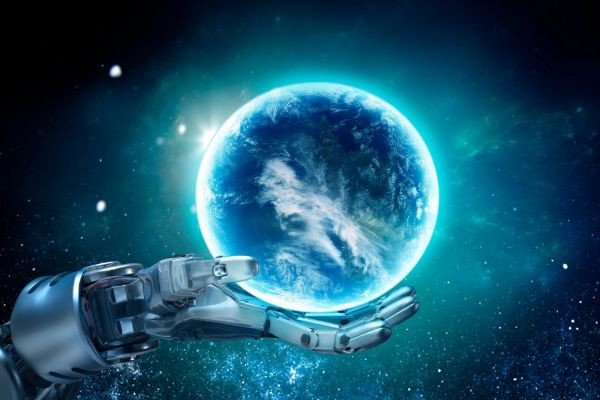Artificial Intelligence (AI) is not merely a buzzword; it has become an integral part of our daily lives. From personalized recommendations on streaming services to autonomous driving, AI technologies are reshaping various industries. But what does this mean for the future of humanity? This article will explore the implications of AI on our lives, the workforce, ethics, and more.
The Rise of AI
AI has witnessed unprecedented growth over the last decade. The amalgamation of big data, advanced algorithms, and increased computing power has allowed AI to become an indispensable tool in many fields.
Opportunities
Personalization and Efficiency: AI enables more personalized and efficient services, enhancing user experience in areas such as healthcare, education, and entertainment.
Economic Growth: AI-driven automation can boost productivity and potentially increase GDP in various economies.
Solving Complex Problems: AI has the power to tackle complex global issues like climate change and disease control through predictive modeling and analysis.
Challenges
Job Displacement: The automation of tasks may lead to job displacement in certain sectors, necessitating retraining and adaptation.
Ethical Concerns: AI can raise ethical questions related to bias, privacy, and decision-making, particularly in sensitive areas like law enforcement and healthcare.
Security Risks: The rise of AI introduces new vulnerabilities, including the risk of AI-driven cyber-attacks.
The Workforce of the Future
The integration of AI into the workforce is a double-edged sword. While it promises increased efficiency and innovation, it also brings concerns about job loss and inequality.
New Job Creation: AI will create new roles and industries, requiring a workforce with specialized skills.
Reskilling: Continuous learning and adaptability will become vital as traditional roles evolve or become obsolete.
Inequality: Without proper policies, the benefits of AI might not be evenly distributed, leading to increased inequality.
Ethical Considerations
The ethical dimensions of AI are among the most pressing concerns for society. Ensuring transparency, fairness, and accountability in AI systems is vital to maintaining public trust.
Bias: AI models can inadvertently perpetuate biases present in training data, leading to unjust decisions.
Privacy: The pervasive use of AI in surveillance and data analysis can infringe on individual privacy rights.
Regulation: Establishing global standards and regulations will be critical to managing the ethical challenges of AI.
Conclusion
The impact of AI on the human future is vast and multifaceted. It offers unprecedented opportunities for growth, innovation, and problem-solving but also poses significant challenges that must be thoughtfully addressed.
As we stand on the brink of a new era defined by AI, the collective choices we make will shape our future. Embracing the potential of AI while being mindful of its risks will require careful planning, ethical consideration, and a commitment to lifelong learning and adaptability.
By understanding and engaging with these issues, we can harness the power of AI to enhance our lives and create a future that reflects our values and aspirations.
 Bitcoin: $97816.56 0.92%
Bitcoin: $97816.56 0.92%  Ethereum: $3407.70 3.17%
Ethereum: $3407.70 3.17%  Tether: $1.00 0.04%
Tether: $1.00 0.04%  Solana: $255.84 0.44%
Solana: $255.84 0.44%  BNB: $657.62 5.41%
BNB: $657.62 5.41%  XRP: $1.47 0.06%
XRP: $1.47 0.06%  Dogecoin: $0.43 7.61%
Dogecoin: $0.43 7.61%  USDC: $1.00 0.01%
USDC: $1.00 0.01%  Cardano: $1.06 8.73%
Cardano: $1.06 8.73%  Lido Staked ETH: $3387.88 3.16%
Lido Staked ETH: $3387.88 3.16%  TRON: $0.21 7.13%
TRON: $0.21 7.13%  Avalanche: $41.86 5.96%
Avalanche: $41.86 5.96%  Shiba Inu: $0.00 4.82%
Shiba Inu: $0.00 4.82%  Stellar: $0.50 62.96%
Stellar: $0.50 62.96%  Wrapped Bitcoin: $97445.12 1.03%
Wrapped Bitcoin: $97445.12 1.03%  Polkadot: $8.50 34.88%
Polkadot: $8.50 34.88%  Chainlink: $17.36 11.66%
Chainlink: $17.36 11.66%  Bitcoin Cash: $508.76 4.59%
Bitcoin Cash: $508.76 4.59%  UNUS SED LEO: $8.61 1.29%
UNUS SED LEO: $8.61 1.29%  NEAR Protocol: $6.23 10.85%
NEAR Protocol: $6.23 10.85%  Litecoin: $98.99 10.26%
Litecoin: $98.99 10.26%  Uniswap: $10.79 14.34%
Uniswap: $10.79 14.34%  Internet Computer: $11.41 13.48%
Internet Computer: $11.41 13.48%  Multi Collateral DAI: $1.00 0.05%
Multi Collateral DAI: $1.00 0.05%  Crypto.com Coin: $0.19 2.76%
Crypto.com Coin: $0.19 2.76%  Sp8de: $0.59 12.94%
Sp8de: $0.59 12.94%  Ethereum Classic: $29.77 6.19%
Ethereum Classic: $29.77 6.19%  VeChain: $0.04 30.22%
VeChain: $0.04 30.22%  Artificial Superintelligence Alliance: $1.38 12.24%
Artificial Superintelligence Alliance: $1.38 12.24%  Filecoin: $5.30 12.5%
Filecoin: $5.30 12.5%  Stacks: $2.07 7.05%
Stacks: $2.07 7.05%  OKB: $50.81 10.31%
OKB: $50.81 10.31%  Monero: $160.22 0.93%
Monero: $160.22 0.93%  Aave: $176.23 7.37%
Aave: $176.23 7.37%  Fantom: $0.88 23.38%
Fantom: $0.88 23.38%  Algorand: $0.30 22.64%
Algorand: $0.30 22.64%  The Graph: $0.24 13.67%
The Graph: $0.24 13.67%  Hedera Hashgraph: $0.15 11.15%
Hedera Hashgraph: $0.15 11.15%  Injective: $28.14 15.47%
Injective: $28.14 15.47%  Cosmos: $8.23 12.84%
Cosmos: $8.23 12.84%  THORChain: $5.66 7.79%
THORChain: $5.66 7.79%  THETA: $1.91 13.05%
THETA: $1.91 13.05%  MANTRA DAO: $3.66 0.65%
MANTRA DAO: $3.66 0.65%  Raydium: $5.96 1.09%
Raydium: $5.96 1.09%  Maker: $1651.02 0.69%
Maker: $1651.02 0.69%  Arweave: $22.08 26.09%
Arweave: $22.08 26.09%  Bitcoin SV: $70.63 5.52%
Bitcoin SV: $70.63 5.52%  KuCoin Token: $11.44 3.43%
KuCoin Token: $11.44 3.43%  Polygon: $0.57 22.05%
Polygon: $0.57 22.05%  Flow: $0.83 16.29%
Flow: $0.83 16.29%  Quant: $101.48 18.65%
Quant: $101.48 18.65%  Gala: $0.03 16.87%
Gala: $0.03 16.87%  Lido DAO: $1.33 9.16%
Lido DAO: $1.33 9.16%  EOS: $0.77 8.38%
EOS: $0.77 8.38%  Tezos: $1.14 3.33%
Tezos: $1.14 3.33%  Neo: $14.62 10.06%
Neo: $14.62 10.06%  Axie Infinity: $6.67 13.39%
Axie Infinity: $6.67 13.39%  Decentraland: $0.51 19.76%
Decentraland: $0.51 19.76%  Helium: $5.80 7.01%
Helium: $5.80 7.01%  The Sandbox: $0.41 16.16%
The Sandbox: $0.41 16.16%  Akash Network: $3.97 6.71%
Akash Network: $3.97 6.71%  GateToken: $11.02 8.65%
GateToken: $11.02 8.65%  AIOZ Network: $0.82 12.18%
AIOZ Network: $0.82 12.18%  eCash: $0.00 3.88%
eCash: $0.00 3.88%  Pendle: $5.32 7.34%
Pendle: $5.32 7.34%  Nexo: $1.35 2.99%
Nexo: $1.35 2.99%  MultiversX: $35.79 19.19%
MultiversX: $35.79 19.19%  Mina: $0.72 7.56%
Mina: $0.72 7.56%  FTX Token: $2.49 0.87%
FTX Token: $2.49 0.87%  Zcash: $48.03 6.26%
Zcash: $48.03 6.26%  Conflux: $0.17 11.27%
Conflux: $0.17 11.27%  Chiliz: $0.08 11.75%
Chiliz: $0.08 11.75%  IOTA: $0.22 20.53%
IOTA: $0.22 20.53%  Gnosis: $271.94 4.41%
Gnosis: $271.94 4.41%  Oasis: $0.10 16.8%
Oasis: $0.10 16.8%  XinFin Network: $0.05 18.49%
XinFin Network: $0.05 18.49%  SuperVerse: $1.33 8.93%
SuperVerse: $1.33 8.93%  PancakeSwap: $2.17 11.69%
PancakeSwap: $2.17 11.69%  Nervos Network: $0.01 8.12%
Nervos Network: $0.01 8.12%  Curve DAO Token: $0.50 13.2%
Curve DAO Token: $0.50 13.2%  Kusama: $38.29 78.3%
Kusama: $38.29 78.3%  Compound: $64.35 19.81%
Compound: $64.35 19.81%  Kava: $0.49 8.23%
Kava: $0.49 8.23%  TrueUSD: $1.00 0.01%
TrueUSD: $1.00 0.01%  DeXe: $8.48 1.95%
DeXe: $8.48 1.95%  Theta Fuel: $0.07 7.01%
Theta Fuel: $0.07 7.01%  NXM: $72.14 5.1%
NXM: $72.14 5.1%  1inch Network: $0.36 7.95%
1inch Network: $0.36 7.95%  Zilliqa: $0.02 15.36%
Zilliqa: $0.02 15.36%  Synthetix: $1.98 10.93%
Synthetix: $1.98 10.93%  WOO: $0.24 12.67%
WOO: $0.24 12.67%  Celo: $0.80 12.03%
Celo: $0.80 12.03%  Reserve Rights: $0.01 10.39%
Reserve Rights: $0.01 10.39%  Trust Wallet Token: $1.01 5.45%
Trust Wallet Token: $1.01 5.45%  Livepeer: $11.62 11.38%
Livepeer: $11.62 11.38%  IoTeX: $0.04 5.62%
IoTeX: $0.04 5.62%  Enjin Coin: $0.23 15.15%
Enjin Coin: $0.23 15.15%  Holo: $0.00 10.5%
Holo: $0.00 10.5%  Amp: $0.01 8.19%
Amp: $0.01 8.19%  Dash: $33.05 13.21%
Dash: $33.05 13.21% 








